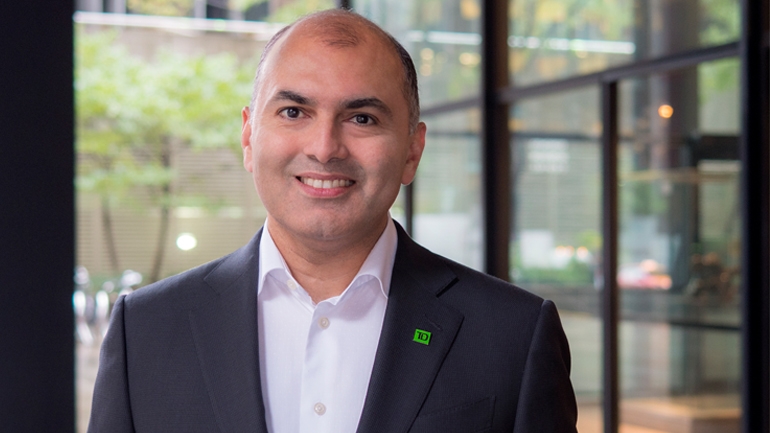Finance Canada has invited businesses to provide their perspective on what they think a Canadian open banking system could look like. We caught up with Rizwan Khalfan, TD's Chief Digital and Payments Officer, to get his thoughts on the opportunities and challenges open banking brings to Canadians.
First off, what is open banking?
Simply put, this is about sharing customer financial transaction data securely and at the customer's request between financial service providers.
Where are we at in Canada?
Rizwan: We're at the beginning of a journey, with the opportunity to build a framework that ensures we're ready for the future while being mindful of the need to address risks and implement an approach that works for consumers. We have a sound banking industry in Canada, one that serves Canadians well, so the conversation will be quite different from other countries that have debated this issue.
As the conversation evolves, we need to carefully balance two main priorities: unlocking the consumer benefit of allowing Canadians to access and share their financial transaction data more easily, with the trust that our customers place in us to ensure that data remains secure.
The potential benefits are real – so are the risks, such as the privacy of customer data and new vulnerabilities to cyber-threats. Only the right balance will serve Canadians and maintain what makes us special on the world stage – a stable, sound and trusted financial services sector.
Getting to the right outcome, one that is in the best interest of our customers, is our goal.
What issues are you are paying close attention to?
Rizwan: Security and privacy are top of mind. Canadians have placed a lot of trust in the financial system, and in banks. Any step we take needs to preserve, and where possible, enhance their belief that their data is being protected and that their interests looked after. We take this responsibility very seriously. It underpins the entire sector and our collective economic future. And, it is the key ingredient to the acceptance and adoption of new innovations by Canadians.
For TD, this means that we innovate only when we believe that our customers are protected. That goes for our collaboration with fintechs and innovators – we hold our entire eco-system to the same high standards. We put our customers' interests first when it comes to how their data is shared to ensure that it remains secure.
At the end of the day, Canadians need to be in charge of who they share their data with and how, safe in the knowledge that it is secure. This means that as an industry, we need to work together to adopt appropriate technical standards and best practices around consent and authentication.
What's your view on how we should approach this in Canada?
Rizwan: This needs to be a carefully thought through journey that unlocks potential while preserving what makes Canada stand apart.
Canada has a lot of advantages on the world stage and paramount among them the trust in our stable financial system. That must be preserved and enhanced and must be at the core of any path forward. All the assurances of privacy, security and safeguarding that Canadians have today must be maintained if we start sharing customer data across financial institutions. We don't need to look beyond our own border for solutions, we need a solution that works for Canadians.
We believe a thoughtful approach is needed. Collaboration across the industry towards a market-led solution, that puts the customer at the centre of our planning and approach, is going to be critical. We need to look at the technical requirements of sharing customer data and develop a clear understanding of the advantages and disadvantages of different approaches. I'm convinced that if we all sit around the same table – banks, credit unions, fintechs and other players – we can chart a path forward that delivers on what Canadians expect of us.
And, perhaps as important, we need to move at the speed with which our customers and the public will be comfortable. We need to address market-drivers such as consumer expectation, speed of adoption, security of infrastructure and other dynamics.
I know this is doable. Canada has proven to the world that we can innovate and deliver for consumers while protecting and strengthening the system in parallel. It's what makes this country's financial system so special compared to other jurisdictions.
What's next?
Rizwan: It's still early days. We need more discussion, thought and debate. We're excited about the opportunity to evolve and innovate in a way that works for Canadians. That's something we've always done at TD, it's in our DNA to adapt to meet our customers' needs while protecting the trust they place in us. We will bring that same approach to this important issue.
The consultations taking place are a good first step. We look forward to their initial thoughts. And then, the work really begins – to assemble around a common table, to test concepts against the dual imperatives of unlocking new capability and protecting trust in the system, and to create industry standards that will serve as guardrails for a thoughtful introduction of new innovation.
Canada has always been smart about the evolution of its financial sector. I'm excited by the future potential of digital. As we embark on a responsible and methodical journey, I know we will work together to find the right way forward.

